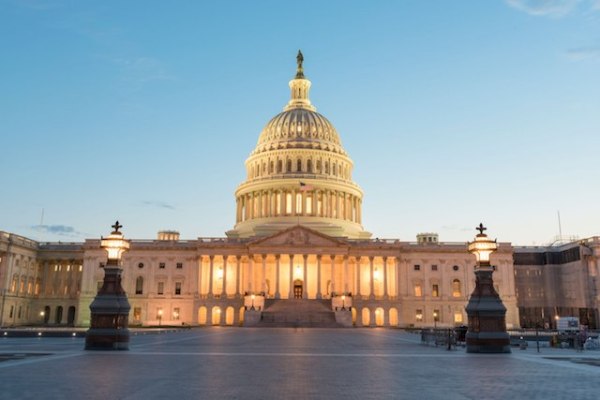One of the more unexpected sights within the United States Capitol lies just outside the Old Supreme Court Chamber. There you can find a plaque marking the first ever long-distance communication by electronic telegraph, which took place inside the Capitol in 1844, when Samuel Morse sent and received messages from Baltimore.
Morse’s first experimental line was made possible thanks to a grant from the federal government. The telegraph would go on to transform American life, allowing instant communication across vast distances. Suddenly, we were not bound by the speed of the horse or the ship and the world would never be the same.
Visitors to the Capitol today wouldn’t expect to see cutting edge experiments taking place inside the building and sadly, they probably don’t have much faith that Congress is even thinking about the future at all. This shows up in the rhetoric and it shows up in our budgets. Washington spends way too much time re-litigating the past — witness how much time has been devoted to debating old trade deals, the 2010 Affordable Care Act or the 1980s Reagan tax cuts — and has increasingly budgeted and legislated in a backwards looking way.
Instead of embracing the trends of the future and empowering our citizens, too many policymakers would rather roll back the clock. According to data collected by the Brookings Institute, federal investment in research and development has declined significantly in recent decades, falling from 2.23% of our Gross Domestic Product (GDP) in the 1960s to just 0.77% in 2016 (GDP). Think about that, across the same decades when we saw a globally-connected high-tech economy emerge, we dramatically scaled back investment in R&D.
As the founder of the Artificial Intelligence Caucus, I’ve been working to start a new dialogue on Capitol Hill that is focused on the future. Recently, I introduced the House version of the FUTURE of AI Act that would create a formal process for both Congress and the Executive Branch to start looking at AI seriously, asking hard questions and consulting experts on what the next steps should be.
When I talk to people in the private sector, in research, in the sciences, AI dominates the discussion. Moreover, artificial intelligence isn’t just analogous to previous groundbreaking technologies like the steam engine, the telegraph, the microchip — it’s potentially even more transformative, because it represents an innovation that reaches across technologies and disciplines, from health care to transportation and logistics and beyond.
The goal of the AI Caucus is to bring in academicians, entrepreneurs, scientists, ethicists, etc. and have them brief Congress on what’s happening in AI, what it means and what we need to do. Our caucus is bipartisan and co-chaired by my friend Republican Rep. Pete Olson of Texas.
Rep. Olson and I come from different parts of the country and bring different perspectives to the table, but we both want to make sure that our colleagues are educated on what’s happening and start thinking about what needs to be done to make sure the country can benefit from AI.
Understandably, there’s a lot of anxiety about AI. I believe that overall artificial intelligence is going to be a net positive. Advances in technology always are – we can often see the old jobs that are going to go away, but we can’t see right away the new jobs that are going to be created. Earlier this year, during a Facebook Live on AI I hosted, Dr. Sebastian Thrun made the point that before the Industrial Revolution, it was necessary for most people to work in the fields planting and harvesting food, often in physically demanding circumstances.
New technology freed up incredible amounts of human potential as entirely new industries were formed, with more people capable of contributing to them. But that doesn’t mean that there won’t also be disruption and with it new challenges and new problems. Elected officials have a fiduciary duty to make sure that we’re prepared for what’s coming and that people and regions aren’t left behind.
The best thing for us to do is to get proactive. The Future of AI Act creates a 19 member advisory committee at the Department of Commerce. The committee is required to have academics, technologists, labor organizations and civil liberties groups represented, as well as people from all parts of the country. Because we also know that many places aren’t really benefiting from the technological revolution yet and we want to change that.
This committee will be required to study four key issues and make recommendations to the White House and to Congress as to what we should do to serve the national interest. Including: 1) how to encourage more investment in research and to make sure that the US is the global leader in innovation 2) how we can make sure workers benefit and the workforce is prepared for the new kinds of jobs being created, 3) making sure AI programs aren’t biased and 4) protecting civil liberties, privacy and individual rights.
This is a bipartisan bill. In the Senate it was introduced by Senator Cantwell of Washington and Senator Todd Young of Indiana. As Democrats and Republicans, we’re trying to move forward. This is really how I think we should make policy. It’s focused on the future, focused on a very important macro issue. We’re working in a bipartisan way and it’s going to be focused on the facts. Let’s get all the experts together, take a close look at what’s happening and then hear their recommendations on what we need to do next to help the country.
I want to make sure that AI is good for working people, good for businesses and good for our economy and that it’s implemented in an ethical way. Let’s get to work.
